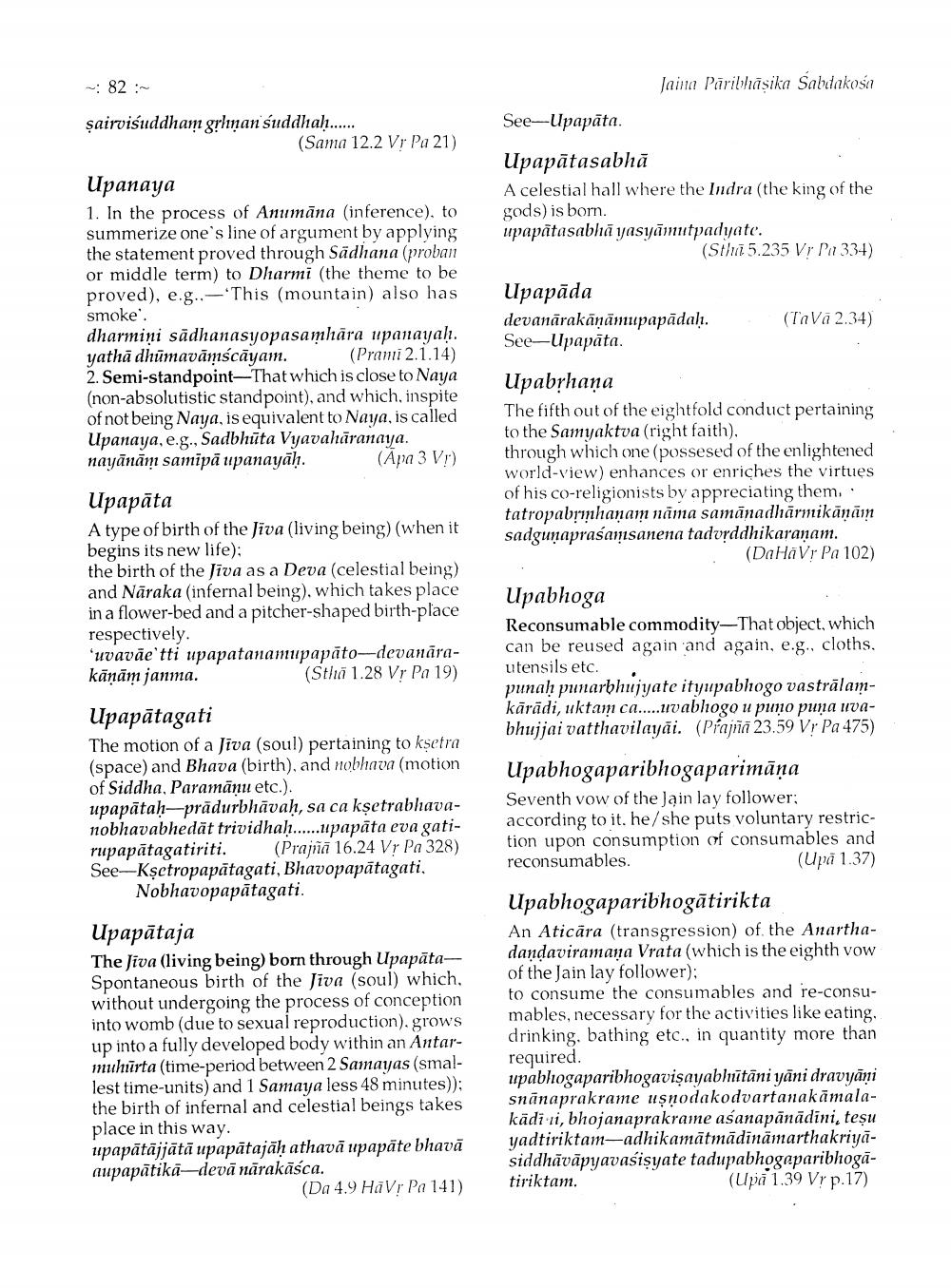________________
Jaina Pāribhāșika Sabdakosa
- 82 - şairvisuddham grlınan suddhah.....
(Sama 12.2 Vr Pa 21)
See-Upapāta.
Upapātasabhā A celestial hall where the Indra (the king of the gods) is born. upapātasabhā yasyāmutpadyate.
(Sthri 5.235 Vr P 334)
Upanaya 1. In the process of Anumāna (inference), to summerize one's line of argument by applying the statement proved through Sädhana (proban or middle term) to Dharmi (the theme to be proved), e.g..-This (mountain) also has smoke'. dharmiņi sādhanasyopasamhāra upanayah. yathā dhūmavāmscāyam. (Pranii 2.1.14) 2. Semi-standpoint-That which is close to Naya (non-absolutistic standpoint), and which, inspite of not being Naya, is equivalent to Naya, is called Upanaya, e.g., Sadbhūta Vyavahāranaya. nayānām samīpā upanayāḥ. (Apa 3 Vr)
Upapāda devanārakāņāmupapādah. See-Upapāta.
(Tavā 2.34)
Upabrhana The fifth out of the eightfold conduct pertaining to the Samyaktva (right faith), through which one (possesed of the enlightened world-view) enhances or enriches the virtues of his co-religionists by appreciating them tatropabrınhaņam nāma samānadhārmikāņām sadguṇaprasamsanena tadurddhikaraṇam.
(DaHaVr Pa 102)
Upapāta A type of birth of the Jiva (living being) (when it begins its new life): the birth of the Jiva as a Deva (celestial being) and Nāraka (infernal being), which takes place in a flower-bed and a pitcher-shaped birth-place respectively. 'uvaväe'tti upapatanamupapăto-devanārakāņāmjanma.
(Stha 1.28 Vr Pa 19)
Upabhoga Reconsumable commodity—That object, which can be reused again and again, e.g., cloths. utensils etc. punah punarbhujyate ityupabhogo vastrālamkārādi, uktam ca.....uvablogo u puno puna uvabhujjai vatthavilayãi. (Praja 23.59 Vr Pa 475)
Upapātagati The motion of a Jiva (soul) pertaining to ksetra (space) and Bhava (birth), and nobhava (motion of Siddha, Paramānu etc.). upapātah-prādurbhāvah, sa ca kşetrabhavanobhavabhedāt trividhah......upapāta eva gatirupapātagatiriti. (Praja 16.24 Vr Pa 328) See-Kșctropapātagati, Bhavopapātagati,
Nobhavopapātagati.
Upabhogaparibhogaparimāna Seventh vow of the Jain lay follower; according to it. he/she puts voluntary restriction upon consumption of consumables and reconsumables.
(Upå 1.37)
Upapātaja The Jiva (living being born through Upapāta-- Spontaneous birth of the Jiva (soul) which, without undergoing the process of conception into womb (due to sexual reproduction). grows up into a fully developed body within an Antarmuhirta (time-period between 2 Samayas (smallest time-units) and 1 Samaya less 48 minutes)); the birth of infernal and celestial beings takes place in this way. upapätäjjātā upapātajāḥ athavä upapäte bhavā aupapātika-devā nārakāśca.
(Da 4.9 HãV! Pa 141)
Upabhogaparibhogātirikta An Aticāra (transgression) of the Anarthadandaviramana Vrata (which is the eighth vow of the Jain lay follower); to consume the consumables and re-consumables, necessary for the activities like eating. drinking, bathing etc., in quantity more than required. upablogaparibhogavişayabhnitāni yāni dravyāņi snānaprakrame usnodakodvartanakamalakädiyi, bhojanaprakraine asanapānādini, teșu yadtiriktam-adhikamātmādināmarthakriyasiddhāvāpyavasisyate tadupabhogaparibhogātiriktam.
(Upă 1.39 Vr p.17)




